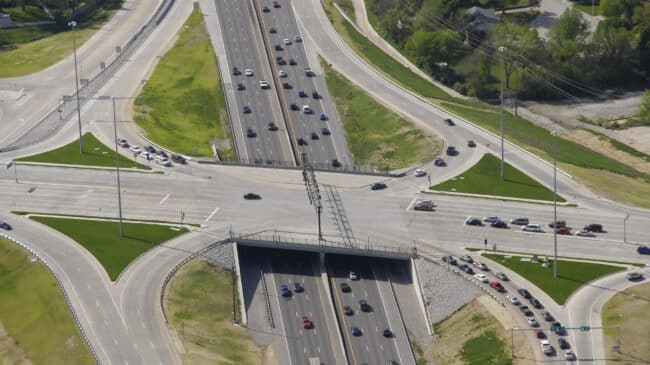Many politicians, media commentators and transportation advocates claim the federal Highway Trust Fund is bankrupt. It is true that for the past 13 years, Congress has allocated $157 billion (so far) more for highways and transit than the revenue received from federal user taxes paid by motorists and truckers. What is bankrupt, however, is not the Highway Trust Fund but congressional transportation policy.
Our elected representatives have failed to control transportation spending or to prioritize what they fund. Since the 1970s, Congress has continually expanded the scope of the Highway Trust Fund to provide grants for mass transit, sidewalks, bike trails, and even (at one point) transportation museums.
Federal gas taxes, which were once highway user taxes, are now seen by most people as ordinary taxes. Highway users continue to pay the tax, but many other people and programs now also benefit from gas taxes. It’s no wonder highway users (most Americans) have lost trust in the Highway Trust Fund.
There is an obvious way to begin restoring motorist and trucker trust: Return the Highway Trust Fund to its original users-pay/users-benefit principle.
Congress has created part of the current problems by funding all kinds of transportation and urban betterment programs on the backs of motorists and truckers paying fuel taxes. Under the most recent trust fund legislation, the Fixing America’s Surface Transportation Act, or the FAST Act, which expires September 30 following a one-year extension in 2020, highway user tax revenues bring in about $42 billion per year, according to a recent brief from the Congressional Research Service (CRS). Highway Trust Fund outlays total $58 billion a year, but highway spending is only $45 billion a year. Thus, virtually all of the so-called shortfall in the Highway Trust Fund is due to Congress spending money on non-highway programs.
One of the options the Congressional Research Service lays out is to remove mass transit and the other non-highway programs from the Highway Trust Fund and have Congress fund them directly. This would be more honest than funneling general-fund money through the trust fund to pretend that we still have a users-pay/users-benefit system. CRS notes that the annual gap between federal highway revenue and federal highway spending is only $2.2 billion for fiscal year (FY) 2022, but could rise to $9.9 billion by FY 2027 due to modest spending increases and less fuel being consumed. It also notes that each one-cent-per-gallon increase in those federal fuel taxes would raise $1.7 to $1.8 billion per year.
So here is an idea for lawmakers, including fiscal conservatives and centrist Democrats. Restore trust in the Highway Trust Fund by returning it to the original promise: The money highway users contribute in fuel taxes will be held in trust and spent for their direct benefit. This would restore highways to being self-supporting again: users-pay/users-benefit. If Congress wants to keep spending $45 billion on highways per year with only $42 billion paid in fuel taxes a year, they would have to straight-up propose a federal gas tax increase.
For the non-highway projects currently funded through the trust fund, Congress could make the case for, and be accountable to voters for, however many billions of general tax money they wish to spend on mass transit, Amtrak, proposed high-speed rail lines, bike trails, and other non-revenue-generating projects.
If Congress does raise the gas tax, it would be a placeholder until this country comes to grips with the longer-term need to replace per-gallon fuel taxes with per-mile charges. The gas tax is not sustainable. Electric vehicles don’t pay gas taxes. And today’s more fuel-efficient vehicles pay far less in gas taxes than most older vehicles.
Restoring the user-pays principle to the Highway Trust Fund would also set an important precedent for any future mileage-based user fees: Those mileage-based user fees should be true user fees, paid for by drivers to highway providers. This would be just like the payments we make for utilities, such as electricity, telecommunications, and water supply. Motorists and truckers are more likely to support a transition to per-mile charges if they can be assured the new fees will not be taxes that can be diverted and spent on anything Congress or a state legislature desires.
A highway user fee is a means to pay for the capital, operating, and maintenance costs of highways. Elected officials may also decide to charge externality taxes to cover things like particulate matter and CO2 emissions, but externalities are a different issue. An emissions tax will go away when those emissions end, but a mileage charge will continue to be needed as long as we have roads and highways. Congress needs to keep these two policies separate, going forward.

